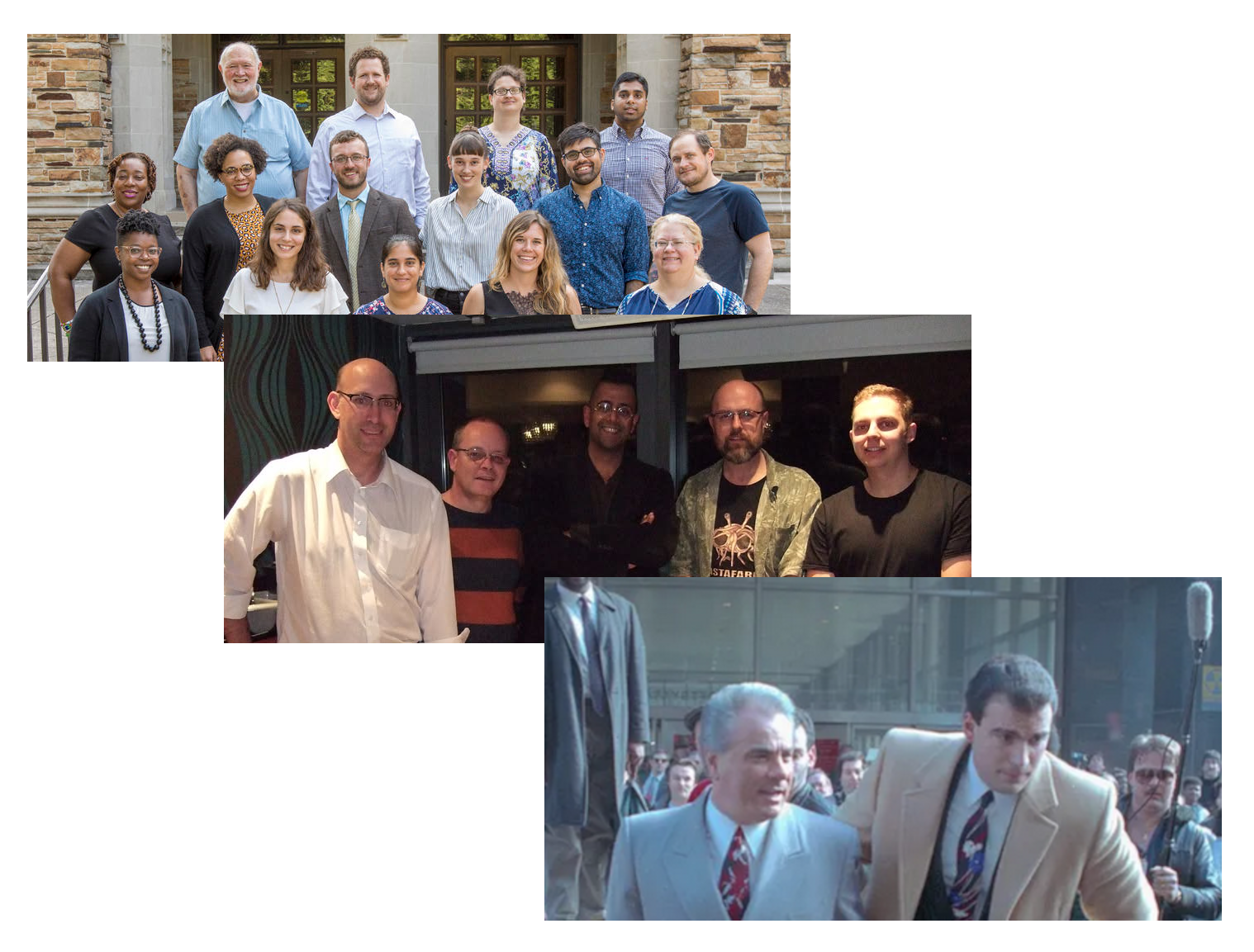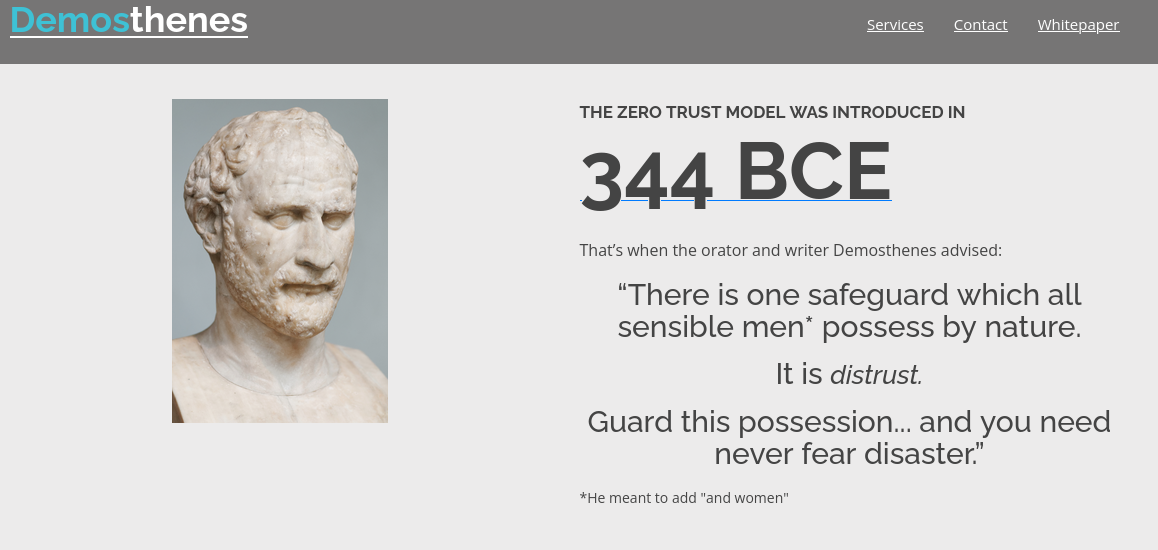CDM Worlds
Each of us lives in one of three worlds:

The three worlds are
The Collegial Assumptions World
The Demosthenic Assumptions World
The Mafiistic Assumptions World
The three worlds are differentiated by assumptions about trust.
Which one do you live in?
1. The Collegial Assumptions World
The root word “college” is the tipoff. In most contexts a college is a secondary or post-secondary educational institution or a part of one. Additional meanings are given by The Cambridge Dictionary as “a group of people with a particular job, purpose, duty, or power who are organized into a group for sharing ideas, making decisions, etc.” It then defines“collegial” as “relating to a friendly relationship between colleagues.”
Phil Zimmermann’s PGP builds the assumptions of the Collegial Assumptions world into a system with documented rules and standards. PGP is a perfect framework for the embodiment of collegial assumptions.
Collegials understand that personal accountability is an essential part of a working society, and that in a society whose structure is increasingly digital, identity reliability is at the core of accountability. People must be accountable for their words and actions.
In PGP, identity is established in a beautifully collegial method. Individuals vouch for each others’ claims of identity, and the more people from more collegial groups who say you are who you claim to be, the higher your identity reliability score. That collegial method works charmingly well for collegial groups.
Then when PGP is exposed to the rest of the world, where people from the the third set of assumptions (which we will get to shortly) live, PGP falls flat. PGP is eminently corruptible when money and power enter the picture.
When real money is at stake, how difficult is it to gather a few larcenous non-collegials in order to corrupt PGP by vouching for each others’ fake identities? To make the job easier, each participant can create dozens of fake identities and have them all join associations and clubs that lack membership controls. For good measure they’ll use email addresses from a variety of easily penetrated domains.
That vulnerability never entered the view of the collegials, because, you know, our people don’t behave like that. And our people don’t care enough about money to let it jeopardize their relationships with other collegials. And, well, we maintain the boundaries of our collegial circles such that we tend not to mingle with people from outside those circles so we tend to not encounter, you know, greed and avarice. We invest our retirement savings with financial advisors who avoid the word “fiduciary,” in funds that obfuscate their fees, because their marketing makes them appear… you know… collegial. They're one of us.
Collegials and their authority allergy
Authority is craved by people with certain personality disorders (narcissism, megalomania, egocentrism, etc.) Authority provides that which those people lust after, which is power. When they do get that authority, thus power, it is so frequently misused that authority in general is distrusted by the collegials.
Collegials themselves seem to have a low apparent appetite for power, although that appetite is sometimes present but is suppressed and denied because it contradicts collegial assumptions.
PGP is one of countless manifestations of the effort to dispense with authority. It’s a wonderful tool for collegial communities. It reinforces their denial of the existence of greed and avarice. And because their world purportedly excludes greed and avarice, they believe that decentralization serves as a viable replacement for authority.
Now if there were to be – this is hypothetical of course – such things as greed and avarice, then a firmer basis for accountability, and therefore identity, would be needed. If you and I are to believe that a person claiming to be Jennifer is really Jennifer, and that the real Jennifer is accountable not just to one counterparty in a blockchain transaction but rather to all those she deals with, then we need (gasp!) an authority that attests that this claim of “Jennifer” to be the real Jennifer can be trusted.
As Lawrence Lundy-Bryan notes,
“There is no such thing as decentralized governance.”
A collegial group is a network of nice guys.
And we know how nice guys finish – right?
They “trust, but verify.”
Note the emphasis: trust before verification. PGP and other collegial networks are for communities where trust is more or less assumed.
A Note About Nomenclature
Among members of the third group, which we'll get to shortly, the word “collegials” is replaced with the word “marks” or “chumps.”
But first...
2. The Demosthetic Assumptions World

The second world, based on the second set of assumptions, consists of people who heed the advice of Demosthenes"
"There is one safeguard which all sensible men possess by nature.
It is distrust."
They might also be called “nice guys who have a chance of winning.”
Demosthenes is known as one of the ancient world’s greatest orators. What is less known is the story of how he got to be so skilled at oratory.
Years after his father’s death, Demosthenes discovered that the managers of his father’s large estate had stolen the bulk of it.
Welcome to the real world, Demosthenes. When serious money enters the picture, it turns out that those friendly collegial buddies of your dad’s ain’t quite as collegial as he thought!
So Demosthenes embarked on a protracted study of law and rhetoric. Having honed his skills, he took the managers of his inheritance to court, and won (largely a Pyrrhic victory, as most of the money was gone.)
We are living in an era where mafiistic assumptions are in ascendancy, largely because the collegials who are supposed to be watching the store were unwilling to see the bad parts of human nature and the threats they impose.
Mafiistic assumptions aren’t just about the old guys in The Godfather, but about Silibandia as well.
As Silibandia embraces AI, prepare for something like the genocides that mankind has seen over the millennia, only borderless.
The demosthenics do not believe in decentralization and they do not believe that centralized authority is inherently bad. In fact they believe that centralized authority is essential, and for that reason it must be done carefully and done right.
Authority must be engineered in such a way as to prevent the kinds of abuses that centralized authority has enabled in the past. That was the idea behind efforts such as the Magna Carta, the Icelandic Constitution, and the United States Constitution, and that idea needs to be carried forward into the digital age.
3. The Mafiistic Assumptions World
There’s always someone willing to cite Machiavelli as a source of moral authority - someone to legitimize theft and murder.
Mafias care only about their own internal rules, as exemplified by La Cosa Nostra’s requirements for becoming a “made man.” For the rest of us, murder is not only illegal but way over the edge morally. For a mafia, it’s simply a procedural necessity and has nothing to do with rules from outside the organization.
Ideology is another point of distinction. Legitimate politicians tend to have sets of beliefs, particularly when it comes to economics.While the words“conservative” and“liberal” are regularly tossed around without a lot of definition, legitimate politicians tend to believe those words represent ends of a meaningful spectrum of beliefs, and they see themselves as advocates of policies based somewhere on that spectrum.
Mafias will pretend to observe ideologies in their efforts to recruit chumps, but under the surface it is pure brutal power struggle. A mafia does not care about ideology.
Hitler’s Nazi party and Stalin’s Communist party are purported to represent opposite ends of an ideological spectrum. In fact, their “ideologies” were identical. Their “set of beliefs” starts and ends with “I believe that I should have what is now in your possession.” They were both mafiocracies.
Says your local crime boss:“My belief is that I should be in control of everything, capiche?” You won’t find him (is it ever her?) discussing the merits of parliamentary versus limited-term governance.
While we debate, or rather fight over, politics and ideology, the world’s richest mafioso is conquering us.
Decentralization is important to the collegials as it enables them to pretend that authority, and therefore accountability, are unnecessary.
Decentralization is important to the mafiistics because it provides built-in money laundering and other tools for criminal impunity.
Here's the bottom line: